The following material covers the various views of subsets of AAAS members on each of the 13 issues that were highlighted in our original report about the gaps between scientists and citizens.
Climate Change
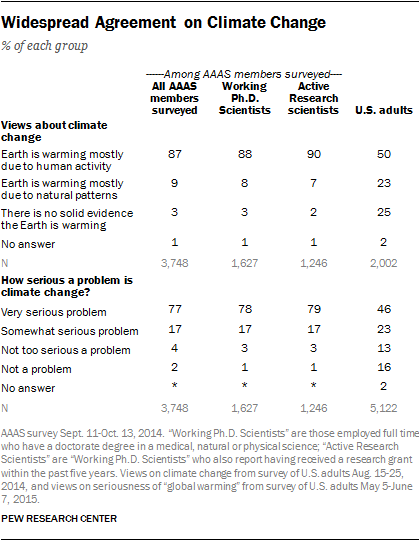
There are wide differences between the general public and AAAS scientists overall when it comes to beliefs about climate change. Fully 87% of AAAS members say climate change is occurring due to human activity, 9% say climate change is mostly due to natural patterns and just 3% of this group says there is no solid evidence the Earth is getting warmer. By contrast, among the general public, half of adults say the Earth is warming due to human activity, 23% say warming is mostly due to natural patterns in the Earth’s environment, and a quarter (25%) say there is no solid evidence the Earth is warming.5
Scientists also are considerably more inclined than the general public as a whole to see climate change as a problem. Fully 77% of AAAS members say climate change is a very serious problem. In a 2015 Pew Research survey, 46% of U.S. adults said “global warming” was a very serious problem. The share of the general public saying that global warming is a very serious problem has fluctuated in Pew Research polling, between a low of 32% in 2010 to a high of 47% in 2009.
Views about climate change are quite similar among those in narrower and more specialized groups of scientists and the full AAAS sample: 88% of Working Ph.D. Scientists say the Earth is warming mostly due to human activity. And 90% of Active Research Scientists say the same. In 2009, 84% of all AAAS members surveyed said the Earth was warming mostly because of human activity.
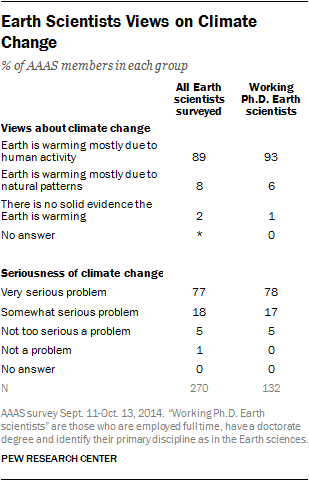
An overwhelming majority of AAAS members across all major disciplines believe that climate change is mostly due to human activity. Those domain experts with a primary specialty in the Earth sciences hold about the same views as all AAAS members surveyed (89% say climate change is mostly due to human activity). The figure rises to 93% among Earth scientists with a doctorate degree who are currently in the full-time workforce.
Views about the seriousness of climate change also tend to be quite similar across subgroups of AAAS members, including those who are Working Ph.D. Scientists (78% say it is a very serious problem), Active Research Scientists (79%) and domain experts who are Earth scientists (77%).
The Pew Research findings on beliefs about climate change are broadly in keeping with a number of other studies, which have shown a high share of experts in the Earth sciences and climatology saying the Earth is warming due to human activity. For example, a survey conducted circa 2008 found 90% of Earth scientists saying average global temperatures had risen and 82% saying that human activity was “a significant contributing factor in changing mean global temperatures.” Those with more direct expertise in climate science were even more likely to say human activity was a significant factor in climate change: 98% of those in the most narrowly defined category of expertise said that in this sampling.6
Energy Issues
Offshore Drilling
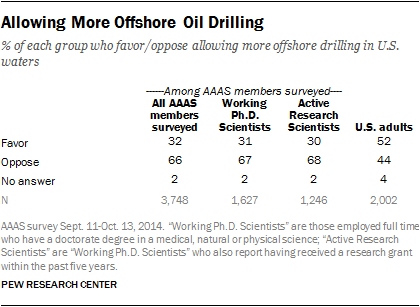
When it comes to offshore oil drilling, there is a 20-point gap between the public’s and AAAS members’ views. AAAS members oppose more offshore drilling by a margin of 66% to 32%. By contrast, about half of Americans (52%) favor allowing more offshore oil drilling in U.S. waters, while 44% are opposed.
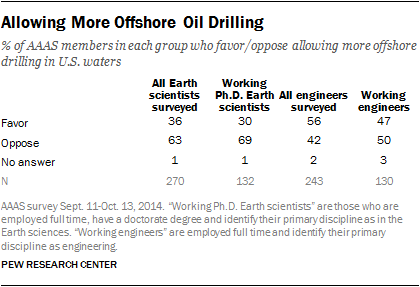
Views about offshore oil drilling are about the same among Working Ph.D. Scientists; 31% of this group favors allowing more offshore oil drilling and 67% opposes this. Views among Active Research Scientists are similar, with 30% in favor and 68% opposed to more offshore oil drilling.
A majority of domain experts in Earth science fields oppose more offshore oil drilling. By comparison, the engineers connected with the AAAS are more closely divided. A 56% majority of this group favors allowing more offshore drilling. And, the AAAS engineers who are employed full time are closely divided over offshore drilling, with 47% favoring and 50% opposed to allowing more offshore drilling.7
Building nuclear power plants
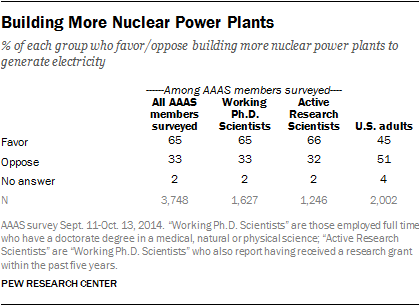
When it comes to nuclear power, there is a 20-point gap between AAAS members’ and the general public’s views, with the AAAS community more inclined than the general public to build more nuclear power plants. Fully 65% of AAAS members favor building more nuclear power plants, while 33% are opposed. Those figures are similar to the subsets of AAAS members who are Working Ph.D. Scientists and Active Research Scientists. By contrast, about half of Americans (51%) oppose building more nuclear power plants, while 45% are in favor.
A majority of AAAS members support more nuclear power plants, regardless of disciplinary specialty. Physicists and engineers are more strongly in favor of building more nuclear power plants than are those in other specialties. For example, 79% of all physicists surveyed and 75% of engineers connected with AAAS favor building more nuclear power plants. The views of Earth scientists are similar to those of all members; 66% among this group favor more nuclear power plants and 32% are opposed.
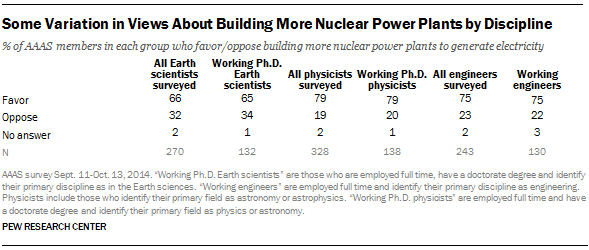
Hydraulic Fracturing
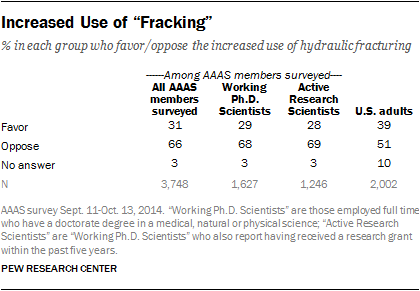
A minority of the public (39%) supports the increased use of hydraulic fracturing (commonly known as fracking) to extract oil and natural gas from underground rock formations, while about half (51%) are opposed.8 By comparison, opinion about fracking among AAAS scientists is more negative: 31% of AAAS members surveyed favor the increased use of fracking while 66% are opposed. Similarly, 29% of Working Ph.D. Scientists favor fracking and 28% of Active Research Scientists say the same.
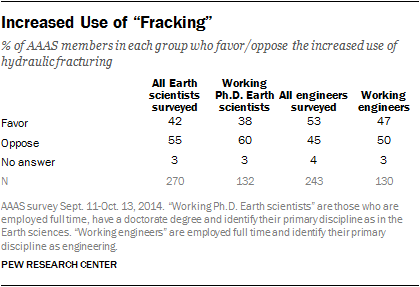
However, scientists’ views about fracking vary across domains. AAAS-linked engineers favor the increased use of fracking by a margin of 53% to 45%. Among AAAS members with a specialty in the Earth sciences, support for fracking tilts more negative, with 42% in favor to 55% opposed. By comparison, AAAS members from other disciplines express less support for fracking; a quarter (25%) of AAAS members with a specialty in the biomedical sciences favors the increased use of fracking, while 73% oppose.
Genetically engineered plants as a fuel replacement
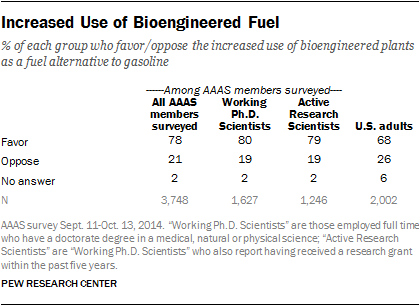
One newer form of energy development — increased use of genetically engineered plants as a fuel alternative to gasoline — draws strong support among both AAAS scientists and the general public. Fully 78% of all AAAS scientists surveyed favor increased use of this technology, as do 68% of Americans. Similarly, 80% of Working Ph.D. Scientists favor the increased use of bioengineered fuel as do 79% Active Research Scientists.
Global Population Growth and Resource Strain
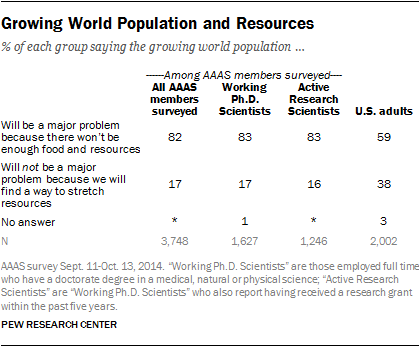
AAAS scientists are particularly likely to express concern about world population growth’s likely effects on the planet’s natural resources. Fully 82% of AAAS members surveyed say population growth will be a major problem because there will not be enough food and resources to go around, while 17% say this will not be a major problem because the world will find a way to stretch its natural resources. Views among subsets of AAAS members are similar: 83% of Working Ph.D. Scientists and 83% of Active Research Scientists say world population growth will be a major problem.
By comparison, a smaller majority of Americans express concern about world population growth and natural resources: 59% of adults have a pessimistic view about the effect of population growth, saying it will be a major problem. Nearly four-in-ten (38%) take the view that growth will not be a major problem because the world will find a way to stretch its natural resources.
Space Issues
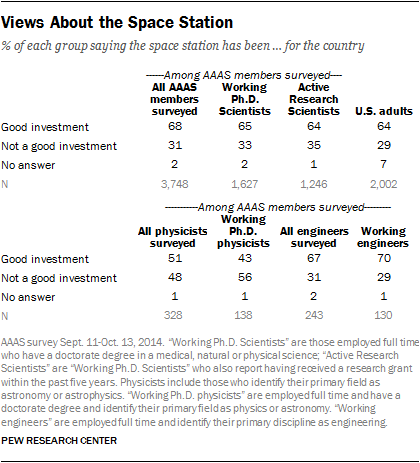
A majority of Americans see the International Space Station as a good investment: 64% say the space station has been a good investment for the country, 29% say it has not. Views among AAAS members also are largely positive: 68% say the space station has been a good investment for the country and 31% dissent from that view. Among working Ph.D. scientists, 65% say the space station has been a good investment for the country.
Views about investment in the space station are similarly positive among the engineers connected with the AAAS. Fully 70% of engineers in the survey who are working full time consider the space station a good investment for the country, as do 67% of all engineers in the survey.
Another group of domain experts, physicists in the AAAS canvassing, are more divided in their views. Among all physicists surveyed, 51% say the space station has been a good investment and 48% say it has not. Among physicists who are employed full time and hold a doctorate degree, opinion tilts (43% to 56%) toward those who say the space station has not been a good investment.
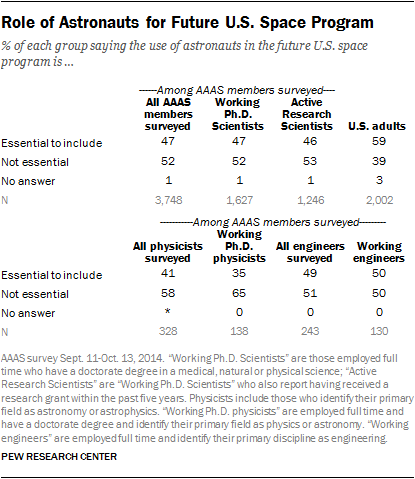
While sending humans into space has been a prominent feature of the U.S. space program in past decades, the future role of human astronauts in the U.S. space program is unclear.9 The Pew Research survey asked respondents to consider whether the use of human astronauts in the U.S. space program is essential or not essential, given the relative costs of manned vs. robotic space exploration. A majority of Americans (59%) take the view that human astronauts are an essential part of future U.S. space exploration. By contrast, AAAS scientists, whether grouped broadly or narrowly, are more closely divided over whether human astronauts are essential in the space program going forward. Among all AAAS members, 47% say human astronauts are essential and 52% say they are not. Opinions are the same among the subsets of Working Ph.D. Scientists and Active Research Scientists.
Engineers connected with the AAAS also are closely divided over the future role of astronauts in the U.S. space program. Half of full-time-employed engineers say astronauts are essential to include in the future U.S. space program and half disagree. A majority of AAAS physicists say astronauts are not essential. Among Ph.D. physicists who are employed full time, 65% say astronauts are not essential, with a minority of 35% saying astronauts are essential.
Childhood Vaccines
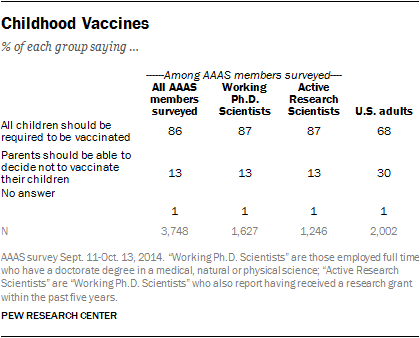
There is an 18-point gap between the general public and AAAS members overall when it comes to whether vaccines for childhood diseases, such as measles, mumps, rubella and polio, should be required or left up to parental choice. Fully 86% of all AAAS members surveyed say childhood vaccines should be required; just 13% say parents should be able to decide. By comparison, 68% of the general public says such vaccines should
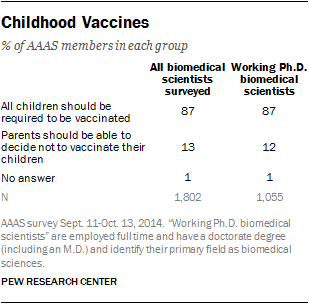
be required, while 30% say parents should be able to decide whether or not to vaccinate their children.
Views among subsets of AAAS members are similar to those in the full sample. Fully 87% of Working Ph.D. Scientists and a similar share of Active Research Scientists say vaccines should be required. And among domain experts – the AAAS members whose primary discipline is in a biomedical field – views are about the same. Fully 87% of this group says vaccines should be required and 13% say parents should be able to decide.
Food Safety
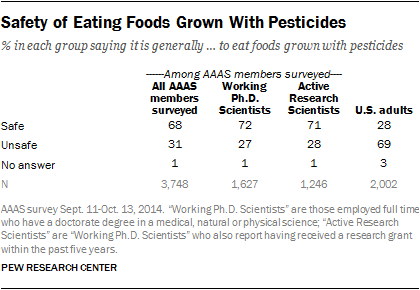
On food safety issues, the Pew Research survey found a large opinion gap between the general public and the scientific community.
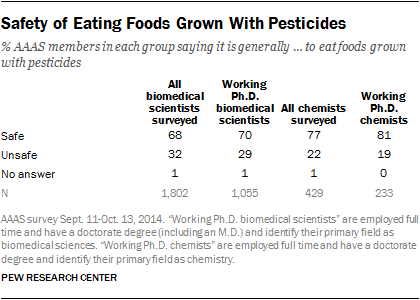
Fully 68% of AAAS members consider eating foods grown with pesticides to be generally safe, and 31% say it is generally unsafe. By contrast, 69% of U.S. adults say eating such foods generally is unsafe, while 28% say it is safe. There is a 40 percentage point gap between the two groups.
Active Ph.D. Scientists are slightly more lopsided: 72% of this group says the foods grown with pesticides are generally safe and 27% say they are not safe, yielding a slightly larger difference between this group and the general public.
The domain experts who are chemists connected with the AAAS even more strongly hold the view that foods grown with pesticides are safe for consumption. Fully 81% of AAAS chemists who are employed full time and hold a doctoral degree say such foods are safe, as do 77% of all chemists surveyed.
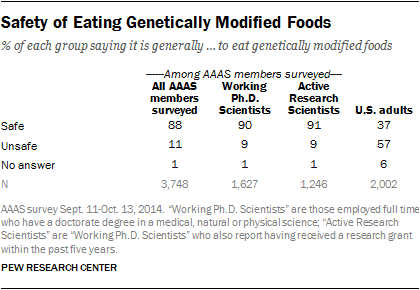
The largest gap between the public and AAAS members occurs in views about the safety of genetically modified organisms (GMOs). Fully 88% of all AAAS members surveyed say they consider genetically modified (GM) foods to be generally safe. By contrast, a minority of adults (37%) say eating GM food generally is safe, while 57% say they believe it is unsafe.
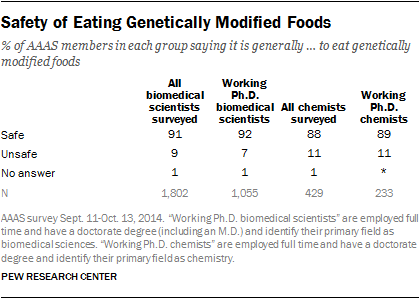
Views about the safety of GMOs are similar among subsets of AAAS members. Nine-in-ten Working Ph.D. Scientists say eating GM foods is safe, as do 91% of Active Research Scientists.
Similarly, 91% of the domain experts who are biomedical scientists connected with the AAAS say GM foods are generally safe, as do 88% of chemists.
Use of Animals in Scientific Research
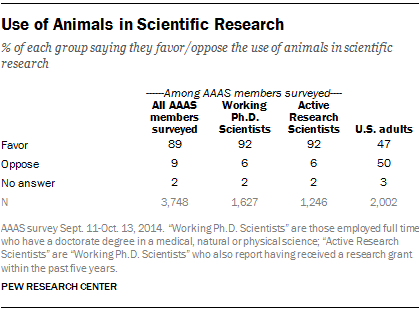
There is strong consensus among AAAS members in support of using animals in scientific research. Among all AAAS members surveyed, 89% favor such research. Those figures are slightly higher among Working Ph.D. Scientists and Active Research Scientists (92% in each group favor research using animals).
By comparison, the general public is closely divided when it comes to the use of animals in research. Some 47% favor and a nearly equal share (50%) oppose animal research. Public support for the use of animals in research is down slightly from 52% in 2009.
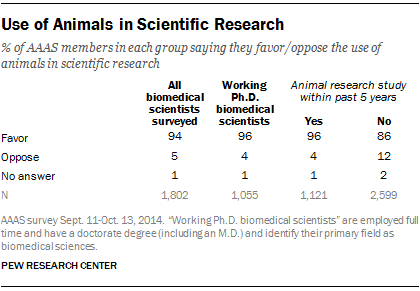
The domain experts connected to the AAAS with a background in a biomedical discipline also are overwhelmingly in favor of animal research. Not surprisingly, 96% of those who report having conducted animal research within the past 5 years favor the use of animals in research but so, too, do 86% of those who have not conducted such research in recent years.
Views about Evolution
Virtually all AAAS members surveyed say “humans and other living things have evolved over time”: 98% of AAAS members in our sample say this and 99% of Working Ph.D. Scientists and Active Research Scientists say so. And nine-in-ten AAAS members say evolution has occurred due to natural processes, such as natural selection; a small minority (8%) says that evolution was guided by a supreme being.
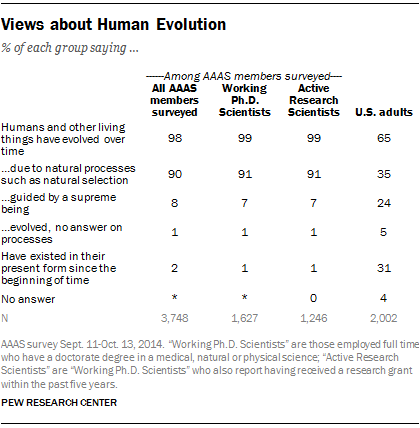
These views contrast sharply with beliefs about evolution among the general public. About two-thirds (65%) of Americans say humans and other living things have evolved over time while 31% say “humans and other living things have existed in their present form since the beginning of time.”
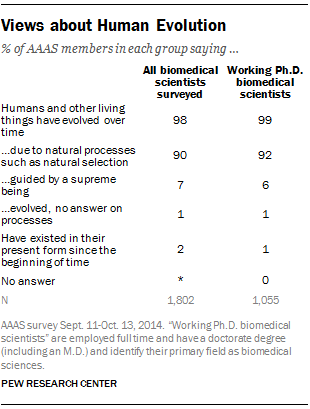
Roughly half of adults who say humans have evolved over time believe that evolution has occurred from natural processes such as natural selection (35% of all adults), while a somewhat smaller share (24% of all adults) believe a supreme being guided the evolution of humans and other living things.
There is near consensus among all AAAS members, regardless of discipline, that humans and other living things have evolved over time. Among domain experts who are biomedical specialists, 98% say humans have evolved and nine-in-ten say evolution is due to natural processes.




